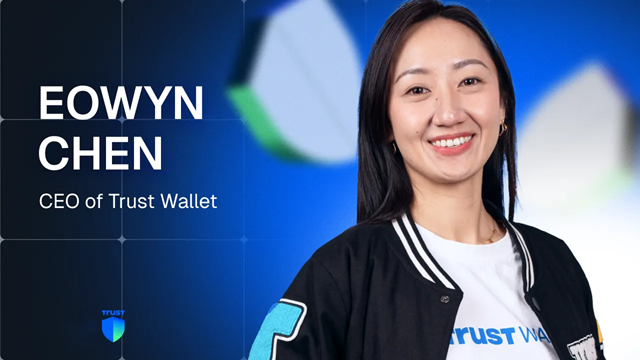After Surpassing 200 Million Downloads: Trust Wallet CEO Eowyn Chen Charts Next Steps

Trust Wallet surpassed the 200 million download milestone this year and is set to be the most downloaded crypto wallet app globally by March 2025. As the demand for autonomy and control over digital assets grows, the company is shifting its strategy from being just a place to store assets to a fully integrated platform with tools to support interactions with the Web3 ecosystem.
In this interview, CEO Eowyn Chen shares about Trust Wallet’s product direction, the rise of AI, and the challenges of building accessible tools that still ensure user autonomy. She also discusses her leadership style and long-term vision for driving the company’s growth towards user empowerment.
Eowyn Chen: As a trusted companion in the Web3 world, we not only provide a way for users to store their digital assets, but also help them explore, learn, and interact securely. Wallets are not just financial tools, they are gateways to the economy of the future. This means simplifying technical barriers, providing timely information, and keeping users protected throughout their journey.
We always stay true to our core values: standing on the side of users, upholding asset self-management, and empowering freedom without compromise. Whether users are making their first transaction or interacting with an AI-powered dApp, Trust Wallet will be a trusted guide.
BeInCrypto: Surpassing 200 million downloads and becoming the most popular wallet app globally by March 2025 is a significant milestone. What do you think this milestone says about user behavior trends in the Web3 world, and what signals do you notice the most?
Eowyn Chen: This milestone shows that users are increasingly valuing autonomy, access, and ownership of assets. Asset self-management is no longer just for early adopters but has become a mainstream expectation.
We also see a need for tools that simplify Web3 without taking away user control. Product onboarding needs to be improved, cross-chain experiences need to be smoother, and security needs to be built right into the experience.
At a deeper level, we’re tracking metrics beyond downloads: user retention, trust, and the real problems users want to solve with Web3 tools. Our job is to listen and build intentionally, not just scale for the sake of growth.
BeInCrypto: You’ve mentioned that you want to develop Trust Wallet as the “Revolut of Web3.” What does this mean in practice, and what role do features like token discovery, anti-fraud, and fiat access play in this strategy?
Eowyn Chen: Think of it as combining the smoothness of Web2 fintech applications with the freedom and transparency of Web3.
In practice, this means making it easy for users to move between experiences: accessing crypto from fiat, discovering real on-chain investment opportunities, interacting with dApps, and avoiding threats like scams or fake tokens. Our goal is to create a seamless experience where everything — from security to discovery — feels trusted and consistent.
We’re not trying to replace banks or exchanges, but rather provide a self-custody solution that gives users complete control.
BeInCrypto: TWT’s utility is becoming increasingly important in the user journey. Can you share how TWT plays a role in increasing user engagement and community participation?
Eowyn Chen: We are focused on aligning TWT’s utility with what users value. This could include supporting gas fees, increasing staking rewards, or unlocking loyalty benefits.
The more TWT’s utility becomes embedded in a user’s everyday experience, the more it can drive long-term engagement. It’s not about short-term incentives, but about creating mechanisms that encourage engagement and build trust over time.
BeInCrypto: With the rise of AI in Trust Wallet, how do you balance useful automation with the responsibility of protecting user privacy?
Eowyn Chen: We believe that AI can enhance asset management, not replace it. It is important that AI provides intelligent context without taking away the user's decision-making power. Whether it is alerting users to suspicious addresses, summarizing transactions, or helping users troubleshoot problems, AI will be more like an assistant than a complex system.
